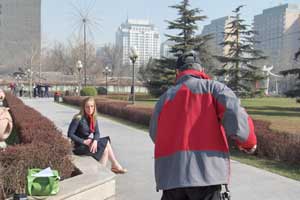Comments on 鈥淪unset Love鈥�
cctv.com 10-15-2005 17:58
As a college student, I actually visited the retirement community that is the backdrop for several of these interviews. It was in early 2002, and I went with one of my teachers and three of my classmates. I remember being really surprised listening to my teacher advise us not to ask the people we would come across there questions like, 鈥渨here do your children live?鈥�She (accurately) felt that the residents there would find it a sensitive topic, as the expectation was that elderly people live with their adult children. For seniors to 鈥渉ave to鈥�live in a retirement home 鈥�even one like this one, which is arguably the best such facility in all of China! -- was practically a snub. When I returned three years later to do interviews for this episode, the difference in the attitudes of the residents we talked to was remarkable. Several interviewees made comments like 鈥淚 enjoy being in an environment surrounded by my peers,鈥�and, 鈥渋n many ways, living with my children would be lonelier than living here because my children work all the time, and here I am with hundreds of people who are in the same situation I鈥檓 in.鈥�If my observation that attitudes were changing quickly was correct, it was not hard for me to imagine, then, that these residents might be relatively open to the prospect of remarriage 鈥�either for themselves or for their peers.
|

|
|
|
At least among the dozen or so residents that we interviewed preparing this show, it certainly did seem that attitudes towards remarriage were ahead of the curve in Chinese society at large. For our first interview, we interviewed a female resident who had once been a successful film director. (Her comments were not ultimately aired.) I was more than a little surprised to hear her confidently tell me that modern Chinese women did not face any of the frustrations with inequality that their western counterparts did. She felt that the issue of remarriage (theoretically, as opposed to in China specifically) was ultimately a feminist issue, as women tend to live longer than men and are more likely to lack financial support. (I did some background research to see whether statistics supported her claims, and was surprised by how right she was: according to UN statistics, in the year 2000, the female-to-male ratio of the world population was 1.1 for persons aged 60-69; 1.3 for the 70-79 age group; 1.8 for the 80-89 age group; 2.9 for the 90-99 age group; and 4.0 for those aged 100 and over. As to financial independence, UN statistics show that in Asia in 1995, only 19% of women over age 60 were still in the labor force, whereas 51% of men still were.) Thus, she claimed, social or institutional barriers to remarriage affect women disproportionately. I fully agree with her conclusion, but I disagree that the social barriers to remarriage among seniors do not exist in Chinese society. As some of the participants in our show attested, those who contemplate remarriage at an older age face protests ranging from financial concerns to gossip 鈥�and however inconsequential it may seem on paper, the pressure exerted by the threat of ostracization from one鈥檚 social group cannot be understated.
Here, I would also like to give special thanks to Dr. Julius Song, a professor from the Chinese Academy of Social Sciences, who went way out of his way to help me with several parts of this program. Among many other favors, he generously gave me an afternoon of his time and let me pick apart his brain (and his housekeeper鈥檚 brain!) to better understand the way people from different parts of China view this issue. At its core, opposition to remarriage among seniors is usually a practical one: no one wants to see anyone wrongfully separated from his wealth and property. Not one to be satisfied with simply identifying the problem, Dr. Song even helped me draft a potential solution. To paraphrase his idea, he proposed that the pervasive 鈥渘eighborhood committees,鈥�(a social mechanism that was more highly utilized before China鈥檚 market reforms, when work life and social life were more intimately connected) be mobilized to educate their jurisdictions about the utility of legally binding wills. In this way, more people could be educated about legal options that would protect themselves and their loved ones in any event, but especially in the event of remarriage late in life. Dr. Song鈥檚 critical acumen and generosity contributed an invaluable depth to this program.
Editor:Liu Source:CCTV.com